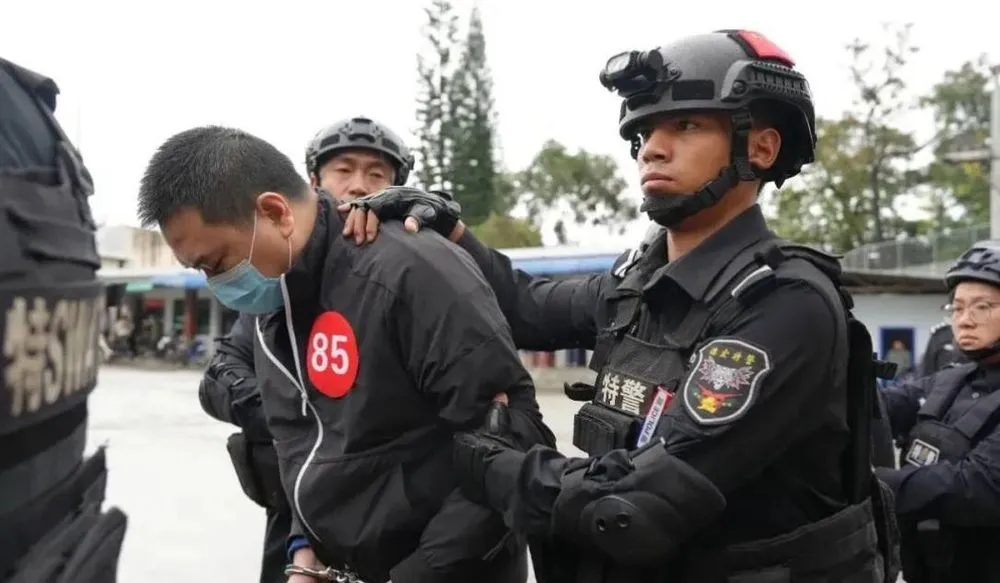US sanctions companies behind cyber scam centers in Cambodia, Myanmar
The U.S. Treasury Department on Monday sanctioned multiple people and businesses associated with cyber scam compounds across Myanmar and Cambodia.
The sanctions take aim at the Burmese, Cambodian and Chinese nationals running entities controlling and supporting scam centers that have led to more than $10 billion in losses from Americans, according to senior Treasury Department official John Hurley.
Secretary of State Marco Rubio said U.S. officials sanctioned nine people and companies involved in running Shwe Kokko — a hub for scam centers in Myanmar — as well as four individuals and six entities for their roles operating forced labor compounds in Cambodia.
“These sanctions protect Americans from the pervasive threat of online scam operations by disrupting the ability of criminal networks to perpetuate industrial-scale fraud, forced labor, physical and sexual abuse, and theft of Americans’ hard-earned savings,” Rubio said in a statement.
In most cases, scammers use the potential of romantic relationships or friendships to convince unwitting Americans to invest in fraudulent businesses or cryptocurrency schemes. The issue is exacerbated when scammers tell victims they must invest more to get their initial payment back.
Coming after Karen
In Myanmar, U.S. officials targeted the sanctions at the Karen National Army (KNA), which partnered with the Burmese military to take control of the country’s southeastern Karen State.
The leaders of the militia now profit from cyber scam centers located in Shwe Kokko — a notorious town on the border with Thailand that has become a scam center hub since the onset of the country’s civil war.
The leaders of the KNA now profit from the cyber scam centers by trafficking people into the area and selling utilities to the scam center operators. As with many scam compounds across Southeast Asia, thousands of people are tricked with fake job offers and lured into scam centers where they are held against their will and forced to conduct scams targeting people in the U.S., Europe and China.
On Monday, the U.S. sanctioned Saw Chit Thu, Tin Win, Saw Min Min Oo and their companies Chit Linn Myaing Company, Chit Linn Myaing Toyota Company, Chit Linn Myaing Mining & Industry Company, Shwe Myint Thaung Yinn Industry & Manufacturing Company.
The Treasury Department also sanctioned She Zhijiang, Yatai International Holdings Group and another shell company tied to him.
She Zhijiang and Saw Chit Thu created one of the largest scam compounds in Shwe Kokko and earn millions through scams, gambling prostitution and more, according to TK.
Saw Chit Thu is considered a leader of the KNA and delegates the scam center operations to his deputies Tin Win and Saw Min Min Oo — who control property that hosts the scam centers, provide security for those facilitating illicit money flows, and personally run entities that control and support scam compounds in Karen State, according to U.S. investigators.
Saw Chit Thu has been repeatedly sanctioned by the U.S., U.K. and European Union for his role as a longtime power broker in the Myawaddy area of Karen State along the border with Thailand. The Treasury’s Office of Foreign Assets Control also sanctioned his two sons, Htoo Eh Moo and Saw Chit Chit, in May.
Tin Win runs a company called Shwe Myint Thaung Yinn Industry & Manufacturing Company that provides energy to the scam compounds in Shwe Kokko. Thailand has repeatedly shut off the power going into the scam centers but the efforts have failed to stop the facilities from operating.
Cambodian casino scam centers
The sanctions on Monday included several companies behind scam centers in Cambodia — many of which operate legally as casinos run by Chinese criminal gangs. The casinos have become hubs for cryptocurrency scams that have pilfered billions of dollars from American and Chinese nationals.
The Treasury Department sanctioned Dong Lecheng, Xu Aimin, Chen Al Len, Su Liangsheng and their companies T C Capital, HH Bank, K B X Investment, K B Hotel, Heng He Bavet and M D S Heng He.
Much of the activity takes place in Sihanoukville, a beach city in the south of Cambodia. T C Capital is one of several companies that owns buildings in Sihanoukville including Golden Sun Sky Casino and Hotel — a hub for cryptocurrency scams carried out by human trafficking victims.
Casinos are an ideal vehicle for cyber scams because they allow leaders to quickly launder the earnings from the thefts and house operations in discreet locations.
The sanctions target Chen Al Len — who owns the Heng He Casino and an associated complex of buildings in Bavet, Cambodia. The company has taken workers from scam compounds in Sihanoukville and runs many virtual currency scams itself.
Through multiple real estate companies and banks, Chen Al Len is tied to other Chinese gang leaders like Su Liangsheng as well as Try Pheap — one of Cambodia’s few billionaires with a long history of ties to human trafficking, illegal logging and corruption.
Pheap is a close advisor to Cambodia’s longtime leader Hun Sen and his son Hun Manet — who serves as the country’s current prime minister. Pheap was previously sanctioned by the U.S. for a variety of human rights violations.
In 2025 the U.S. has repeatedly sanctioned the officials and companies behind scam centers in Southeast Asia — targeting several of the platforms that help operate the scam websites. In May, U.S. officials took the step of sanctioning Huione Group, a prominent platform used by the scam centers and other cybercriminals to launder stolen funds.
“Southeast Asia’s cyber scam industry not only threatens the well-being and financial security of Americans, but also subjects thousands of people to modern slavery,” the Treasury Department’s Hurley said on Monday.
Jonathan Greig
is a Breaking News Reporter at Recorded Future News. Jonathan has worked across the globe as a journalist since 2014. Before moving back to New York City, he worked for news outlets in South Africa, Jordan and Cambodia. He previously covered cybersecurity at ZDNet and TechRepublic.



